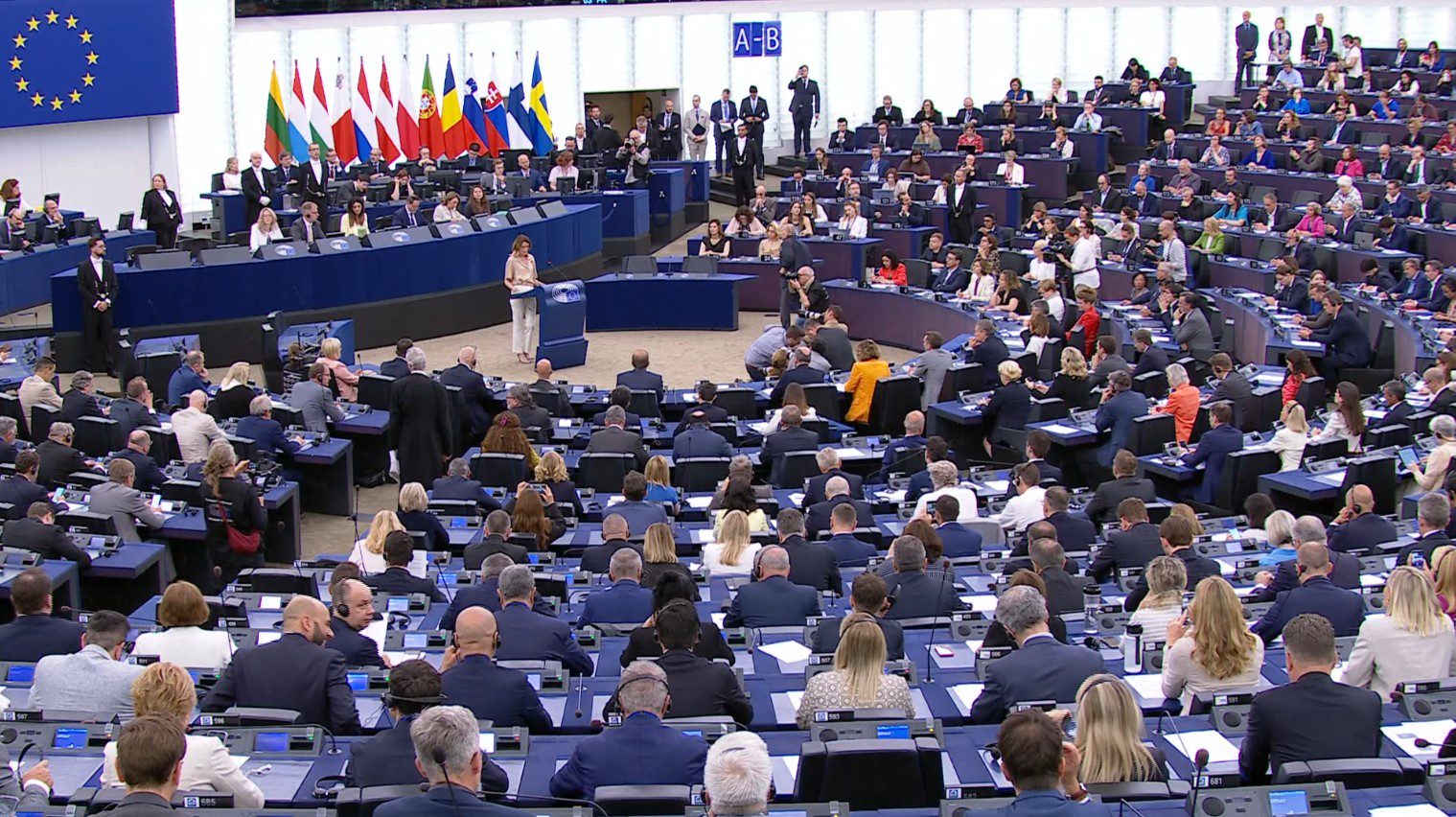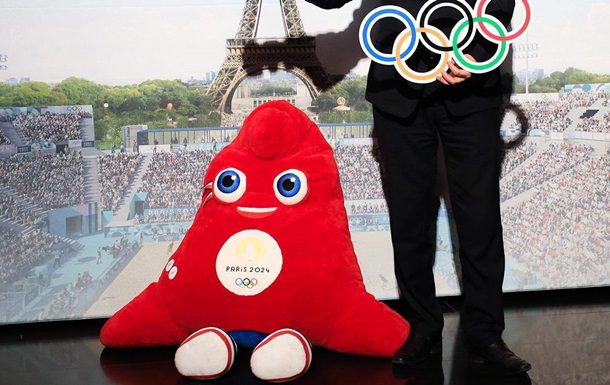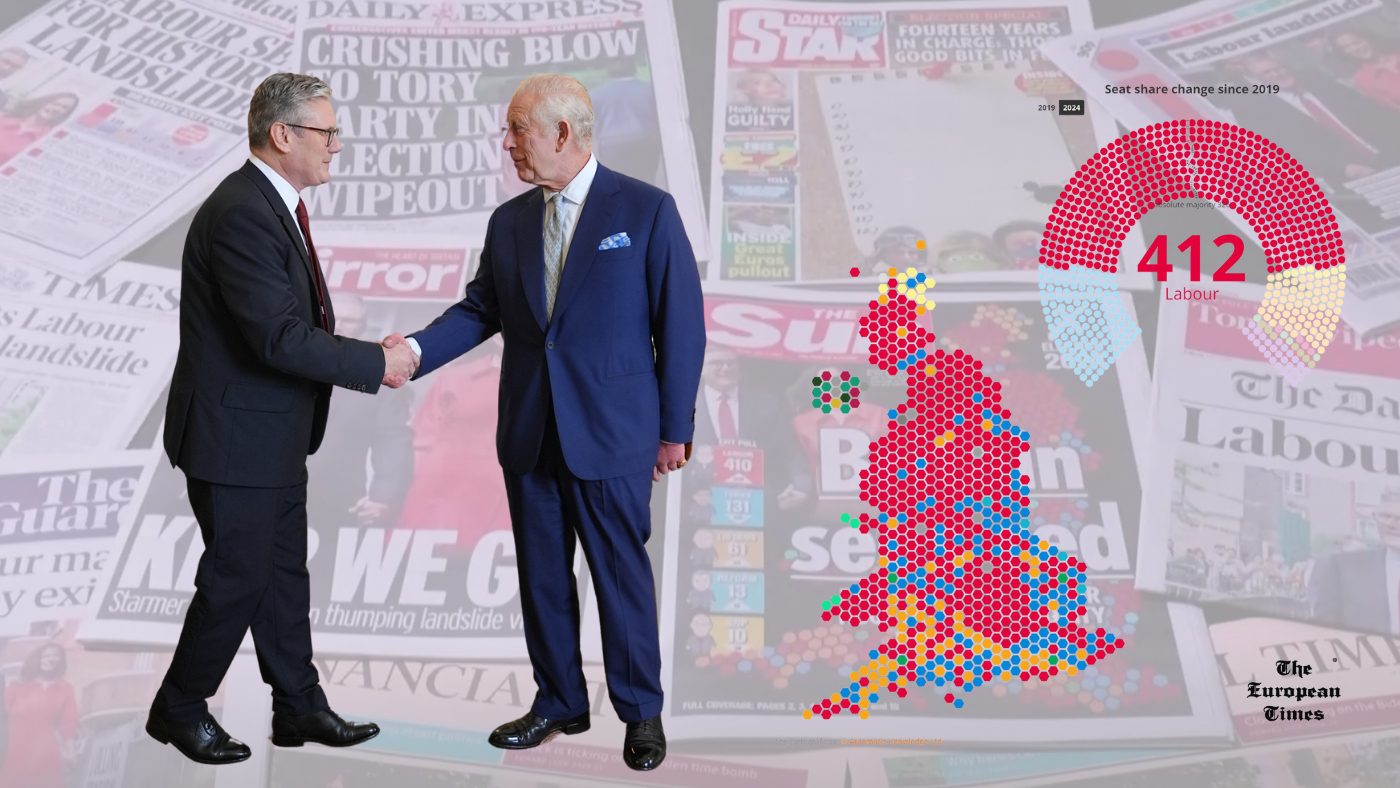Politics
Elections 2024, President Metsola “Vote. Do not let someone else choose for you”
The Key Issues in the European Parliament Elections 2024
Elections 2024 – The European Parliament Elections 2024 are just around the corner, and it’s important to be informed about the issues that will be at the forefront of the election. From climate change to immigration policies, this article provides an overview of the key topics that will shape the election and impact the future of Europe, plus, an important entry on why looking at the managing of fundamental rights could probably be one of the most important issues to look at when looking at the programs of the different parties, even if inclusion in the program does not guarantee that once in power they will not change their views…
But anyway, before we start, here is what current President of the European Parliament, Roberta Metsola, said:
“The European Union is evolving continuously. The world is changing and we must change with it. We need reform. We cannot be afraid of change. The EU is not perfect. We must embrace it as we keep listening, keep explaining and keep delivering.
I encourage everyone to recapture the sense of hope and possibility that the European Union offers. To vote. Do not let someone else choose for you. Be part of the largest democratic exercise in Europe.”
The Future of the European Union.
One of the key issues at stake in the European Parliament Elections 2024 is the future of the European Union itself. With the ongoing challenges and the rise of movements across Europe who want less EU interference in national affairs, the election will be a crucial moment for determining the direction of the EU. Issues such as EU integration, the role of the European Commission, and the balance of power between member states will all be hotly debated. The outcome of the election will have significant implications for the future of Europe and its place in the world.
Immigration and Border Control.
Immigration and border control will be another key issue in the European Parliament Elections 2024. The ongoing refugee crisis and the influx of migrants into Europe have led to a heated debate about how to manage borders and control immigration. Some parties advocate for stricter border controls and limits on immigration, while others argue for more open borders and greater support for refugees and migrants. The outcome of the election will have a significant impact on the future of immigration policy in Europe.
Climate Change and Environmental Policies.
Climate change and environmental policies will be a major topic in the European Parliament Elections 2024. The European Union has set ambitious goals to reduce greenhouse gas emissions and transition to a more sustainable economy. However, there are still debates about the best way to achieve these goals and how to balance environmental concerns with economic growth. The election will determine the direction of EU environmental policies and its role in global efforts to combat climate change.
Economic Growth and Job Creation.
Another key issue in the European Parliament Elections 2024 is economic growth and job creation. The COVID-19 pandemic has had a significant impact on the European economy, with many businesses struggling to stay afloat and unemployment rates rising. The election will determine the policies and strategies that will be put in place to support economic recovery and job creation in the EU. This includes debates about taxation, trade agreements, and investment in key industries such as technology and renewable energy.
Digital Transformation and Data Privacy.
Digital transformation and data privacy are also key issues in the European Parliament Elections 2024. With the increasing use of technology in all aspects of life, including government and business, there is a growing concern about data privacy and security. The election will determine the policies and regulations that will be put in place to protect citizens’ personal data and ensure that companies are held accountable for any breaches. Additionally, the election will address the need for digital transformation in various sectors, including healthcare, education, and public services, to improve efficiency and accessibility while also addressing concerns about data privacy and security.
Why Fundamental Rights Should Be a Priority in the European Parliament Elections
Fundamental rights are the basic human rights that every person is entitled to, regardless of their race, gender, religion, or any other characteristic. As citizens of the European Union, we have the opportunity to vote in the European Parliament elections and ensure that our leaders prioritize and protect these rights for all. Let’s make our voices heard and advocate for a just and equitable society.
What are fundamental rights?
Fundamental rights are the basic human rights that every person is entitled to, regardless of their race, gender, religion, or any other characteristic. These rights include the right to life, liberty, and security of person, freedom of expression and religion, the right to a fair trial, and the right to education and healthcare. They are the foundation of a just and equitable society and must be protected for all.
The importance of fundamental rights in a democratic society.
In a democratic society, fundamental rights are essential for ensuring that every individual is treated fairly and with dignity. These rights provide a framework for protecting individuals from discrimination, oppression, and abuse of power. Without fundamental rights, there can be no true democracy, as the basic freedoms and protections that allow citizens to participate in the democratic process would be absent. It is therefore crucial that fundamental rights are prioritized and protected in the European Parliament elections, to ensure that all citizens can live in a just and equitable society.
The impact of the European Parliament on fundamental rights.
The European Parliament plays a crucial role in protecting and promoting fundamental rights across the European Union. Through legislation, oversight, and advocacy, the Parliament has the power to ensure that these rights are respected and upheld by member states and institutions. In the upcoming elections, it is important to elect leaders who prioritize fundamental rights and are committed to defending them for all citizens, regardless of their background or status. By doing so, we can build a stronger, more inclusive Europe that values the dignity and worth of every individual.
Examples of fundamental rights that need protection.
Fundamental rights are the basic rights and freedoms that every person is entitled to, simply by virtue of being human. These include the right to life, liberty, and security of person, freedom of expression, freedom of religion or belief, the right to a fair trial, and the right to education and healthcare. In recent years, there have been growing concerns about the erosion of these rights in Europe, particularly in areas such as freedom of the press, privacy, and non-discrimination. It is essential that we elect leaders who are committed to protecting these fundamental rights and ensuring that they are upheld for all citizens.
How to vote for candidates who prioritize fundamental rights.
When voting in the European Parliament elections, it’s important to research the candidates and their stances on fundamental rights. Look for candidates who have a track record of advocating for these rights and who have concrete plans for protecting them. You can also check the party platforms to see if they prioritize fundamental rights. Don’t be afraid to reach out to candidates directly and ask them about their positions on these issues. By prioritizing fundamental rights in our voting decisions, we can help ensure that our leaders are committed to creating a just and equitable society for all.
Source link
Politics
European Parliament begins its 10th term

European Parliament Convenes in Strasbourg: New President to be Elected amid Growing Diversity
On a momentous Tuesday in Strasbourg, the European Parliament, following the recent European elections held on 6-9 June, officially commenced its proceedings. The session, presided over by the outgoing EP President, Roberta Metsola of the EPP from Malta, commenced with a musical interlude before Pina Picierno, the second Vice-President in the outgoing Parliament from Italy’s S&D, announced the contenders for the coveted Presidency of the Parliament.
The highly anticipated vote, conducted through a secret paper ballot, is set to occur immediately after the inaugural session. To ensure a fair process, eight MEPs, selected by lot, will oversee the election proceedings.
The distinguished candidates vying for the Presidency are Roberta Metsola representing EPP from Malta and Irene Montero from The Left in Spain. Ahead of the crucial vote, both candidates delivered succinct statements to the plenary, outlining their visions for the future of the European Parliament.
To attain victory, a candidate must secure an absolute majority of valid votes cast, which equates to 50% plus one. In the event of no clear winner in the initial round of voting, subsequent rounds may follow with the possibility of new or existing candidates being nominated under the same stipulations. If needed, a third round could ensue with the same regulations. Should no candidate emerge victorious after the third round, the two candidates with the highest votes in this round will advance to a decisive fourth and final round, with the majority winner emerging triumphant.
Upon the election of the new President, the distinguished individual will assume the leadership position and deliver a notable opening address, setting the tone for the parliamentary term ahead.
In this landmark tenth term, the European Parliament boasts 720 seats, an increase of 15 from the previous legislature. Notably, 54% of MEPs are fresh faces, marking a slight decrease from the 2019 intake of 61%, with the representation of women comprising 39%, down marginally from the 40% mark in 2019.
Among the diverse MEP cohort, Lena Schilling, a 23-year-old from Austria representing Greens/EFA, stands as the youngest member, while the seasoned Leoluca Orlando from Italy, a Green/EFA representative aged 77, holds the distinction of the oldest MEP. The average age of MEPs stands at 50, reflecting a diverse range of experiences and perspectives within the parliamentary body.
As the tenth term commences, the European Parliament encompasses eight political groups, an increase from the previous session. Additionally, 32 MEPs remain non-attached, underscoring the dynamic landscape of political affiliations within the Parliament and highlighting the vibrant tapestry of representation in the European legislative body.
Politics
For the first time in 40 years, the Olympics will not be broadcast in Russia

Not a single TV channel, streaming platform or cinema in Russia will show the competitions from the Summer Olympics in Paris, which begin on July 26, sports.ru writes. This happened for the first time in 40 years, when in 1984 the USSR boycotted the Olympics in Los Angeles.
The official explanation is that this time only 16 athletes will participate under a neutral flag, without an anthem and in “unpopular sports”. The unofficial thing is that this is a purely political decision of the Kremlin, and heads of federations call those who agreed to participate traitors, homeless people and foreign agents.
Paris Mayor on Russians at the 2024 Olympics: It would be better if they didn’t come
Anne Hidalgo condemned the International Olympic Committee’s decision regarding representatives of the aggressor country, she said already in March.
According to the official, it would be good if athletes from the terrorist country did not participate in international competitions.
“I prefer that they not come. We cannot act as if the invasion does not exist. We cannot act as if Putin is not a dictator who is threatening all of Europe today.”
At the same time, she added that such sanctions cannot be imposed against Israeli athletes, since Israel’s actions are different from Russia’s aggression.
“There can be no talk of imposing sanctions against Israel in connection with the Olympic and Paralympic Games. Because Israel is a democratic country,” the mayor told Reuters.
Photo: Social Network / korrespondent.net.
Politics
Keir Starmer Secures Historic Labour Victory, Ending 14 Years of Conservative Rule in UK

London – In a seismic shift in British politics, the Labour Party, led by Keir Starmer, has achieved a resounding victory in the UK general election, bringing an end to 14 years of Conservative governance. The results, which had been foreshadowed by months of polling, have given Labour its strongest parliamentary majority since 2001.
Labour secured an impressive 412 seats, far surpassing the 326 required for an absolute majority and more than doubling their 2019 performance. This landslide victory marks a dramatic turnaround for the party and signals a clear desire for change among the British electorate.
Upon learning of his victory in his central London constituency, Starmer declared, “The people have spoken, and they are ready for change.” This statement encapsulates the mood of a nation seemingly eager to embark on a new political chapter.

The Conservative Party, in stark contrast, suffered its worst defeat since its founding in 1834. The Tories lost at least 250 seats compared to their 2019 performance under Boris Johnson, ending up with a mere 121 seats. This historic collapse prompted the outgoing Prime Minister, Rishi Sunak, to apologize to “those Conservatives who have lost despite their dedication” while congratulating Starmer on his victory.
The election also saw significant shifts for other parties. The Liberal Democrats, led by Ed Davey, emerged as the third-largest party with 71 seats, a gain of 63 from the previous election. The Scottish National Party (SNP) experienced a dramatic decline, securing only nine seats, a loss of 38 compared to 2019. Sinn Fein, the Irish republican party, maintained its seven seats.

In a surprising development, the nationalist-populist Reform UK, led by Nigel Farage, entered Parliament with four seats, exceeding all poll predictions. The Green Party quadrupled its representation, winning four seats in total.
Starmer’s first address as Prime Minister was filled with promises of change and renewal. “We did it!” he exclaimed, emphasizing that Britons would wake up to find “a weight has finally been lifted from the shoulders of this great nation.” He stressed the urgency of rebuilding trust in politics and committed to serving all citizens, regardless of their voting preferences.
The new Prime Minister outlined his government’s priorities, including improving security on streets and borders, rebuilding infrastructure, and enhancing opportunities in education and employment. “Changing a country isn’t as easy as pressing a button,” Starmer cautioned, “We will rebuild the United Kingdom, brick by brick.”
Rishi Sunak, in his farewell speech, acknowledged the clear signal for change sent by the electorate. “I have heard your anger and disappointment. I take responsibility for these results,” he stated. Sunak announced his intention to step down as Conservative Party leader, but not immediately, allowing time for a formal process to choose his successor.
The election also marked a personal triumph for Nigel Farage, who finally won a parliamentary seat on his eighth attempt, representing Clacton-on-Sea. Farage hailed his party’s performance as “extraordinary” and vowed to fill what he sees as a “huge void in the center-right.”
In regional developments, Sinn Fein became the largest Northern Irish party in the British Parliament for the first time, maintaining its seven seats while the Democratic Unionist Party (DUP) fell to four. In Scotland, the SNP lost its dominance, dropping from 48 seats in 2019 to just 8, with Labour making significant gains. Wales saw the Conservatives lose all representation, with Labour dominating the results.
As the United Kingdom enters this new political era under Starmer’s leadership, the country faces significant challenges. The incoming government must address economic concerns, social policies, and perhaps most critically, work to restore public trust in the political system. The scale of Labour’s victory suggests a strong mandate for change, but the real test lies in translating this electoral success into effective governance in the years to come.
-

 Sports6 days ago
Sports6 days agoOfficial: Juventus announces sixth purchase
-

 Health & Society6 days ago
Health & Society6 days agoThe intoxicated society
-

 Politics4 days ago
Politics4 days agoThe Russian patriarch to Putin: You are the first truly Orthodox president
-

 Sports5 days ago
Sports5 days agoBeautiful Juve: Vlahovic and youth rout Verona. Thiago Motta first
-

 Health & Society2 days ago
Health & Society2 days ago7 Superfoods That Will Boost Your Fitness Results
-

 Sports5 days ago
Sports5 days agoJuventus, Vlahovic: “Now we play a different game.”
-

 EU & the World3 days ago
EU & the World3 days agoGrier Henchy Wears Mom Brooke Shields’ 1997 Wedding Dress to HS Graduation
-

 EU & the World5 days ago
EU & the World5 days agoBlake Lively’s Sister Robyn Defends Her Amid Online Backlash








